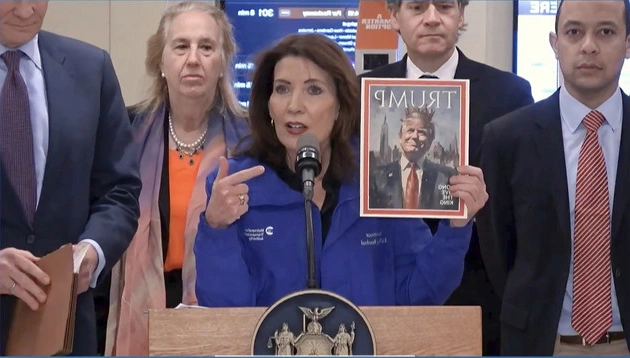
NEW YORK — The Trump administration cannot immediately kill New York’s congestion pricing program or retaliate against the state for keeping it in place, a federal judge ruled on Tuesday.
A temporary restraining order by U.S. District Judge Lewis Liman is another setback for President Donald Trump’s assertive use of executive power and a victory for New York Gov. Kathy Hochul and the Metropolitan Transportation Authority.
The Legal Battle Unfolds
In a series of letters earlier this year, Transportation Secretary Sean Duffy said the tolling program no longer has necessary federal approval and then threatened “serious consequences” if Hochul didn’t stop the tolls, including pulling approval and money for all kinds of public works projects in the state.
Hochul has refused to stop the tolls unless ordered to by a judge, setting up a two-hour showdown on Tuesday.
It appears Liman has no interest in taking down the tolling program, which seems likely to live on as long as the case is in his courtroom. Liman previously ruled in favor of the MTA against a series of other challenges to the tolls.
Liman’s Tuesday restraining order keeps the tolls in place through at least June 9 and prevents Duffy from retaliating against New York.
Federal Intervention and Legal Arguments
In February, Trump posted a graphic of himself wearing a crown and said, “CONGESTION PRICING IS DEAD. Manhattan, and all of New York, is SAVED. LONG LIVE THE KING!”
MTA attorney Roberta Kaplan, who has bedeviled Trump in other cases, argued the federal government under Trump was taking a “radical” approach by trying to rescind approval of the tolls, which the Biden administration approved. She said it would create a “recipe for chaos” if one administration could change its mind about something like this agreed to by a previous one.
In making her argument, Kaplan relied heavily on recent Supreme Court cases that, at first glance, appeared to be wins for conservatives, including the decision that undid the Chevron doctrine and shackled presidential administrations’ powers and another that narrowed the scope of the Clean Water Act. But Kaplan repurposed both to argue against Trump. She said the courts could step in to stop Duffy’s plans and that the MTA was faced with retaliation as soon as a deadline Duffy set for Wednesday, even though an attorney for the federal government insisted there was no imminent retaliation planned against New York.
The federal attorney, Chuck Roberts, argued the MTA should not have relied on Biden-era approvals, since Trump had campaigned and won after making remarks opposed to the tolls.
Liman was skeptical of that argument during 90 minutes of oral argument. He briefly stepped down from the bench and came back with the restraining order after he found that the MTA was likely to succeed in arguing that Duffy had acted illegally by killing the program.
Looking Ahead
But the temporary restraining order is still kind of an interim step before the case — which is ultimately about Duffy’s authority to kill congestion pricing — can be sorted out on its full merits, something Liman wants to tackle as soon as possible. He repeatedly expressed interest in quickly ruling on the broader arguments. Attorneys for the MTA and federal DOT had previously agreed to a schedule that wouldn’t tee up the case for a full decision until late October. But MTA rushed to court because of a deadline Duffy set for New York to end the tolls by May 21 or face penalties beginning on or after May 28.











